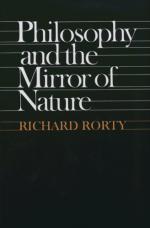|
This section contains 1,654 words (approx. 6 pages at 300 words per page) |

|
An American philosopher and pragmatist, Rorty is among the most widely discussed and controversial philosophers at the turn of the twenty-first century. A New Yorker by birth, Richard Rorty was educated at the University of Chicago (1946–1952) and at Yale (1952–1956) where he received his doctorate in philosophy. After brief flirtations with Platonism and the work of A. N. Whitehead, Rorty's more mature interests began to form at the end of his military service in 1958, at which point he began serious study of the philosophers who would later number among his chief influences: Wilfrid Sellars, Ludwig Wittgenstein, Martin Heidegger, John Dewey, and W.V. O. Quine.
Early Period
Rorty's early work in analytic philosophy, sometimes thought to represent a completely distinct period, is in fact touched by two themes that resurface throughout his career. The first theme is anti-Cartesianism about the mind and knowledge. In a...
|
This section contains 1,654 words (approx. 6 pages at 300 words per page) |

|


